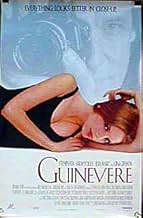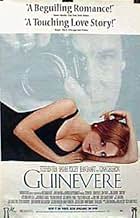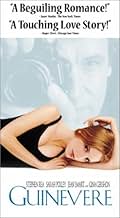AVALIAÇÃO DA IMDb
5,9/10
2,8 mil
SUA AVALIAÇÃO
Adicionar um enredo no seu idiomaA young girl from an affluent family rebels and becomes involved with a much older photographer.A young girl from an affluent family rebels and becomes involved with a much older photographer.A young girl from an affluent family rebels and becomes involved with a much older photographer.
- Direção
- Roteirista
- Artistas
- Prêmios
- 2 vitórias e 7 indicações no total
Sharon McNight
- Leslie
- (as Sharon Mcnight)
Avaliações em destaque
5n8
Technically, Ms. Wells has a superb film here. The cinematography is innovative and germane to the story. The actors all give enjoyable and appropriate performances. The storyline, however, leaves a bit to be desired. I imagine that feminist critics would have a hey-day with this one. I don't buy it. I don't believe the relationships in the film are genuine and honest - it just doesn't work. Ms. Wells explained after the show that she works from a theme and creates her movies that way, and from that perspective, the movie works. If one only looks at the movie for the theme and disregards most other concerns, s/he will love this film. I was disappointed.
This is a murky, unfocused little film. It is clear that Audrey Wells is a talented writer-director, but I felt a lack of assurance in the execution of her story. However, Jean Smart delivers a brilliant performance that enriches the film, making it memorable. She nails every single SECOND of the film she's in; her monologue towards Rea is a devastating piece of acting that was shamefully overlooked by the Academy. This woman is one of the best actresses of her generation, and if you saw her hilarious, Emmy-winning spot on "Frasier" you know she's got strong comedic chops, too. Give Jean Smart better roles!
Writer/director Audrey Wells, who would go on to make 2003's "Under the Tuscan Sun" as well as the recent "Shall We Dance", directed Sarah Polley in 1999's "Guinevere". Wells' forte seems to be characters in search of romance who find it in unexpected places. It was the 'ugly' girl in "Truth About Cats & Dogs", Italy in "Tuscan Sun", and the older man in this film. That older man is played with wild abandon by Stephen Rea, often inappropriately stealing the show. Ignoring Jean Smart's histrionic heavy scene later in the film, and the control Rea's Connie has over Polley's Harper, this is Sarah Polley's film. What make this film work is its sensitivity and subtly, especially toward Harper's youth, naivete, and uncertainty in love and life. It's a sweet film about self-discovery at any age, and although it gets a bit moody toward the end, it works well as a date movie.
The young Canadian actress Sarah Polley can sizzle in character parts--she burns a hole in the screen in her tiny bit in Cronenberg's EXISTENZ, and she was luminous as the princess in the wheelchair in THE SWEET HEREAFTER. But in leading roles, she seems both brittle and amoeboid. As Harper, the insecure and overlooked daughter of a family of cutthroat lawyers, she has one amazing scene--being seduced, her reactions fry out her speakers, sending from giggly hysteria to overdrive lust. Harper is seduced by an aging bohemian wedding photographer (Stephen Rea)--a lush who talks a big game, pontificates in bars with his low-rent cronies, and makes a sport and a pastime of mentoring (and groping) avid young women. But we don't see any hunger, any passion or obsession in Harper. When the photographer, Connie, tells her she has talent it's an obvious pick-up line--not because she hasn't done any work, but because she shows no interest in anything but being noticed.
The writer-director, Audrey Wells, doesn't show much interest in anything else, either. The author of the scripts for GEORGE OF THE JUNGLE and INSPECTOR GADGET, her first indie feature has more than a whiff of the dilettante. Like AMERICAN BEAUTY, GUINEVERE likes to flirt with the idea of having an "edge," then shies away from it. Both of these movies are just too damned clear. The pleasure of that seduction scene is that Harper responds in ways that are messy, funny, unprogrammed; every other scene in the picture makes its point in letters so bold the thickest member of the audience couldn't miss it.
You can take the girl out of the studio, but ain't no way you're taking the studio out of the girl. The lechy photographer's big sin--the thing that makes him evanesce in Harper's eyes--is that, at fifty, he's still stumping and hustling for cash. Can Audrey Wells really intend that it's okay for Connie to be a serial phony, an ego-inflating come-on artist, but his real Achilles' heel is that he never made real money? (Wells' point seems to be: Connie gets Harper's tender young flesh--he could at least pay the bills.) Every scene is so blandly overdetermined it reeks of falsity--especially the much-applauded one where Harper's bitchy mom (Jean Smart) comes into Connie's loft and undoes their relationship with a single cutting observation. (Would these lovers react with such shock to such an obvious accusation?)
For someone making a movie about the romance of the artist's life, Wells seems to have no clue how artists talk to each other, or even behave--she seems to think that's egghead stuff the audience won't care about. But it's that, not sex, that's supposed to be the fundament of Connie and Harper's relationship. Despite Rea's and Polley's efforts, the movie drowns in big-movie timidity. And the ending--a Felliniesque princess fantasy where all of Connie's sweet young things gather for an All That Jazz adieu--maybe intended to be tender. It comes across as a final, passive-aggressive flipping of the bird to a half-forgotten, dirty-minded teacher.
The writer-director, Audrey Wells, doesn't show much interest in anything else, either. The author of the scripts for GEORGE OF THE JUNGLE and INSPECTOR GADGET, her first indie feature has more than a whiff of the dilettante. Like AMERICAN BEAUTY, GUINEVERE likes to flirt with the idea of having an "edge," then shies away from it. Both of these movies are just too damned clear. The pleasure of that seduction scene is that Harper responds in ways that are messy, funny, unprogrammed; every other scene in the picture makes its point in letters so bold the thickest member of the audience couldn't miss it.
You can take the girl out of the studio, but ain't no way you're taking the studio out of the girl. The lechy photographer's big sin--the thing that makes him evanesce in Harper's eyes--is that, at fifty, he's still stumping and hustling for cash. Can Audrey Wells really intend that it's okay for Connie to be a serial phony, an ego-inflating come-on artist, but his real Achilles' heel is that he never made real money? (Wells' point seems to be: Connie gets Harper's tender young flesh--he could at least pay the bills.) Every scene is so blandly overdetermined it reeks of falsity--especially the much-applauded one where Harper's bitchy mom (Jean Smart) comes into Connie's loft and undoes their relationship with a single cutting observation. (Would these lovers react with such shock to such an obvious accusation?)
For someone making a movie about the romance of the artist's life, Wells seems to have no clue how artists talk to each other, or even behave--she seems to think that's egghead stuff the audience won't care about. But it's that, not sex, that's supposed to be the fundament of Connie and Harper's relationship. Despite Rea's and Polley's efforts, the movie drowns in big-movie timidity. And the ending--a Felliniesque princess fantasy where all of Connie's sweet young things gather for an All That Jazz adieu--maybe intended to be tender. It comes across as a final, passive-aggressive flipping of the bird to a half-forgotten, dirty-minded teacher.
Guinevere: Harper Sloane (Sarah Pollack) is a painfully shy young woman trapped in a household of lawyers lorded over by an alpha-mother (Jean Smart) who treats her like a servant. Destined to attend Harvard law school and join the pack, Harper finds her salvation in Connor Fitzgerald (Steven Rea), part-time photographer/philosopher, full-time con-man Svengali. Connor actually listens to what she says and offers her escape into an exciting bohemian lifestyle. Will he be her salvation or downfall? There are shades of Leaving Las Vegas in this film - it is dark and at times unpleasant - one scene in particular made me so uncomfortable I turned away from the screen. To its credit, Guinevere, like Leaving Las Vegas, is also a very good film. Sarah Pollack is outstanding as the withdrawn Harper (in stark contrast to her brazen, street-wise savvy Ronna in Go!). Although she's actually twenty, she looks fifteen, which helps to convey a believable vulnerability and transformation.
Rea is truly manipulative as Connor, more pathetic than sinister, who preys on young women - you're never quite sure if you should loathe or pity him. Finally, Jean Smart does an excellent job as the hard-as-nails matriarch, miles away from her smarmy character on Designing Women.
Well worth the price of admission.
Rea is truly manipulative as Connor, more pathetic than sinister, who preys on young women - you're never quite sure if you should loathe or pity him. Finally, Jean Smart does an excellent job as the hard-as-nails matriarch, miles away from her smarmy character on Designing Women.
Well worth the price of admission.
Você sabia?
- CuriosidadesDuring the non-union shoot in San Francisco, crew members struck and were joined by star Sarah Polley, who walked the picket line. Striking crew members report that they were quite touched by her action, which was more than a gesture, but rather a sincere belief in workers' rights. On her part, Polley called her union, the Screen Actors Guild, to tell them of her action, and the union representative told her they'd back her if she crossed the picket line. SAG assumed that she was calling to ask whether she could defy the strike and cross the picket line! A shocked and dismayed Polley stayed out with the strikers, and the strike ended after three days when their grievances were met. Subsequently, Polley has stated that she has been told that she lost several job offers due to this incident as producers don't want a union 'militant' despite the film industry being a craft industry dominated by the guild (union) system and she did what she felt was right.
- Erros de gravaçãoThe wet spots on Harper's shirt after taking a shower. They're inconsistent.
- Citações
Harper Sloane: You're obviously mistaking me for someone with potential.
- ConexõesFeatured in Siskel & Ebert & the Movies: Double Jeopardy/Jakob the Liar/Mumford (1999)
- Trilhas sonorasCoquette
Music by Carmen Lombardo & Johnny Green
Lyrics by Gus Kahn
Performed by John Pizzarelli
Courtesy of The RCA Records Label of BMG Entertainment
Principais escolhas
Faça login para avaliar e ver a lista de recomendações personalizadas
- How long is Guinevere?Fornecido pela Alexa
Detalhes
Bilheteria
- Orçamento
- US$ 2.600.000 (estimativa)
- Faturamento bruto nos EUA e Canadá
- US$ 632.283
- Fim de semana de estreia nos EUA e Canadá
- US$ 54.145
- 26 de set. de 1999
- Faturamento bruto mundial
- US$ 635.680
- Tempo de duração1 hora 44 minutos
- Cor
- Mixagem de som
- Proporção
- 1.85 : 1
Contribua para esta página
Sugerir uma alteração ou adicionar conteúdo ausente

Principal brecha
By what name was A Lente do Desejo (1999) officially released in India in English?
Responda































